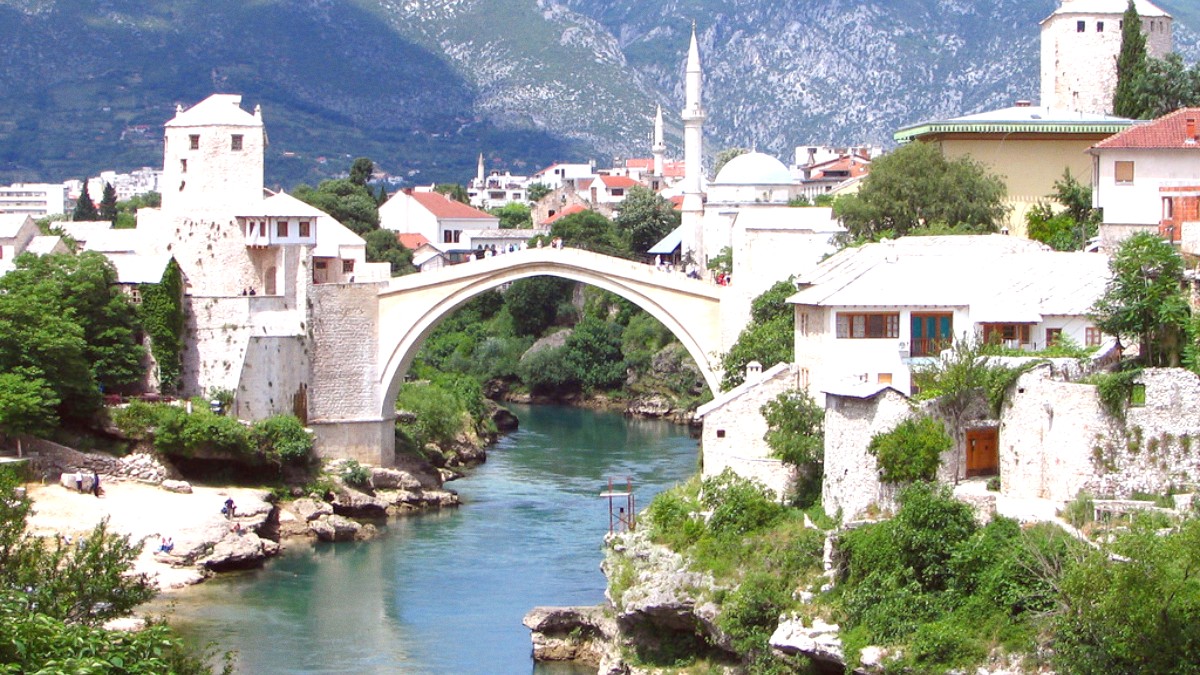
Southern Bosnia And Hercegovina, Bosnia And Hercegovina
From June to August, Mostar sees very hot and sunny days. Daily temperatures often go above 35°C (95°F), sometimes reaching 40°C (104°F). Humidity stays low. This period suits river activities, though the Neretva's water always remains cold, and all attractions function at full capacity. However, extreme heat makes daytime sightseeing uncomfortable. This is also the most crowded time, with higher prices for accommodation and tours.
Autumn, from September to November, starts pleasantly warm and gradually cools. Rainfall increases by November. Temperatures range from 15-25°C (59-77°F). This shoulder season presents comfortable temperatures and fewer crowds than peak summer, and a more pleasant environment for walking and outdoor activities. Accommodation prices are lower. Spring, from March to May, brings mild and pleasant weather, with warming temperatures and moderate rainfall. It is suitable for exploration, with temperatures ranging from 10-20°C (50-68°F). Both shoulder seasons have an increased chance of rain, and evenings become cooler. Some seasonal tours might operate less frequently. Winter, from December to February, is mild and rainy. Occasional snow falls, notably in January. Average temperatures typically stay above 0°C (32°F), ranging from 5-10°C (41-50°F). This low season has the fewest tourists and the lowest prices for accommodation and activities. An authentic local atmosphere awaits, and the possibility of snow on the Old Bridge creates picturesque scenes. Cooler temperatures, more rainfall, and shorter daylight hours limit some outdoor activities. Some tourist-oriented businesses may have reduced hours or be closed.
For outdoor pursuits like hiking, rafting, and exploring waterfalls, the shoulder seasons of April-May and September-October offer comfortable temperatures and pleasant scenery.
For sightseeing and photography, early morning or late afternoon during the shoulder seasons present fewer crowds and optimal light. Cultural events and festivals often occur during summer.
Hot & Crowded
Full attraction operation, river activities.
Extreme heat, higher prices.
Mild & Balanced
Comfortable temperatures, fewer crowds.
Increased rain chance, cooler evenings.
Mild & Authentic
Fewest tourists, lowest prices, authentic atmosphere.
Cooler, more rain, shorter days.
Many nationalities, including EU, US, Canada, UK, Australia, and New Zealand, can enter Bosnia and Herzegovina visa-free. These visa-exempt stays typically last up to 90 days within a 180-day period.
For nationalities needing a visa, the application process usually takes place at a BiH embassy or consulate in their country of residence. Requirements differ by nationality and visit purpose. Check the official Ministry of Foreign Affairs of Bosnia and Herzegovina website for precise, current information. Plan ahead due to varying processing times.
Valid for at least three months beyond your stay (six months preferable).
Proof of your intent to leave BiH.
Evidence of financial support (bank statements, credit card statements).
Hotel booking or invitation letter. No general entry fees for tourists.
A requirement for all foreign visitors involves registering their stay with local police within 24-48 hours of arrival. If you stay in a hotel or a registered guesthouse, the establishment usually handles this registration automatically. If you stay in private accommodation, like an Airbnb, your host takes legal responsibility for registering you, or you must register yourself at the nearest police station. Failure to register results in fines or issues upon departure.
No specific permits are generally needed for standard tourist activities. Health-related entry requirements are not imposed.
The currency in Bosnia and Herzegovina is the Bosnian Convertible Mark (BAM or KM). The BAM is pegged to the Euro at a fixed rate: 1 EUR = 1.95583 BAM. Euros are widely accepted in many tourist areas. However, paying in BAM for accurate pricing is generally better. ATMs are widely available.
Expect to spend between 40-70 BAM (approximately €20-€35 or $22-$38 USD) per day.
Plan for 90-150 BAM (approximately €45-€75 or $49-$82 USD) per day.
Budget 200+ BAM (approximately €100+ or $109+ USD) per day. Accommodation: High-end hotel or boutique apartment (100+ BAM). Meals: Fine dining and upscale cafes (70+ BAM). Transportation: Private transfers and frequent taxi use (20+ BAM). Attractions: Private guides and exclusive experiences (30+ BAM).
15-30 BAM
80-150 BAM
8-15 BAM
10-25 BAM
20 BAM
Tipping is not obligatory but appreciated. In restaurants, rounding up or 5-10% is common. For taxi drivers, rounding up is customary. For tour guides, 5-10 BAM per person for a half-day or full-day tour is appropriate.
No specific vaccinations are required for entry. Consult a healthcare professional before your trip for recommended vaccinations. Commonly suggested immunizations include routine vaccinations (MMR, Diphtheria-Tetanus-Pertussis, Varicella, Polio, Flu), Hepatitis A, and Typhoid. Hepatitis B and Rabies are sometimes suggested for long-term travelers or those with specific animal exposure. Your doctor can give personalized advice.
Sunburn and dehydration are risks during hot summers. Wear sunscreen, a hat, and stay hydrated. Stomach upset can occur from unfamiliar food or water. Practice good food hygiene. Tap water is generally safe for locals, but bottled water can be a preference.
Mostar has public hospitals and private clinics. The main public hospital is University Clinical Hospital Mostar. Quality of care varies; private clinics often offer better standards and shorter waiting times. Payment is usually upfront. For emergencies, dial 112 (general), 122 (police), 123 (fire), 124 (ambulance).
Mostar is generally safe for tourists. Petty crime, like pickpocketing, occurs in crowded tourist areas. Stay vigilant and secure your valuables. A Money belt adds security. Unexploded Ordnance (UXO) poses risk in areas outside major urban centers and off well-trodden paths. Stick to marked roads and trails, especially in rural or war-damaged areas. Never touch suspicious objects. The central tourist areas of Mostar are generally cleared and safe. The Old Town remains very safe due to constant tourist presence.
Travel insurance (World Nomads, SafetyWing, Insubuy) is highly recommended for medical emergencies, trip disruption, and theft. Keep embassy/consulate contact information handy. Compensation for delayed flights: AirHelp. Basic first-aid: Adventure Medical Kits, water filtration: LifeStraw.
Occasional minor tremors, significant damage rare.
Possible during heavy rain, less common in city center.
Regular seasonal hazard in summer, proper precautions needed.